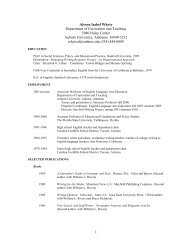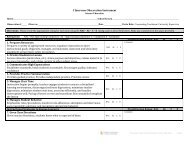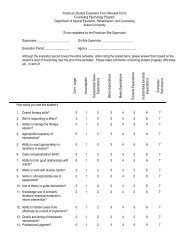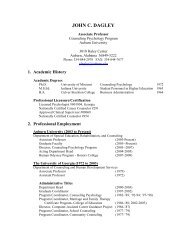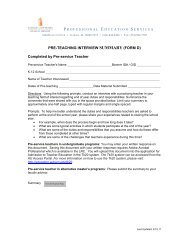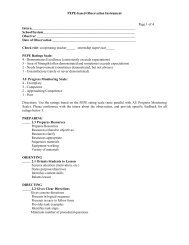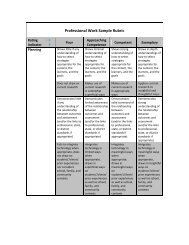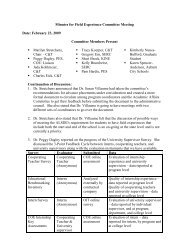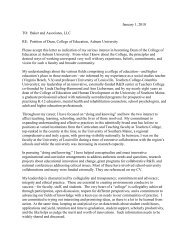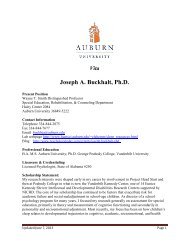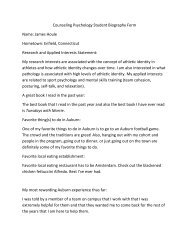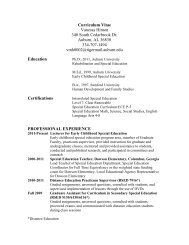8.0MB - College of Education - Auburn University
8.0MB - College of Education - Auburn University
8.0MB - College of Education - Auburn University
- No tags were found...
Create successful ePaper yourself
Turn your PDF publications into a flip-book with our unique Google optimized e-Paper software.
saliva provideslink betweenstress, immunityI n f o u r s e pa r at es t u d i e s conducted bya multi-university researchteam, saliva hasbeen shown to providenew insight into therole <strong>of</strong> social stressorsin child development.The tests focus on anenzyme secreted by thesalivary glands—alphaamylase—thathas beenDr. Joseph Buckhalt linked in adults to thesympathetic nervoussystem’s (SNS) “fight-or-flight” response. Now, inthese new studies, alpha-amylase has been shown tobe a marker for the SNS response in children also.The four research groups—infants and their mothers,preschoolers, children, and teenagers—wereasked to complete a challenging task. These taskswere designed to elicit emotional duress, thereforeallowing researchers to measure the different levels<strong>of</strong> alpha-amylase.Research findingssuggest that socialstressors directlyaffect the level<strong>of</strong> alpha-amylasefound inthe participants’saliva.The stressorsthe participantsencounteredvaried bygroup. For example, The 6-monthold infants were gently restrainedby a stranger. Older children wereasked to complete a frustrating taskin addition to interacting with ateacher or being evaluated.The four studies were detailedin an invited paper, “Integratingthe Measurement <strong>of</strong> Salivary Alpha-Amylaseinto Studies <strong>of</strong> ChildHealth, Development and SocialRelationships,” in a special April2006 issue <strong>of</strong> the Journal <strong>of</strong> Socialand Personal Relationships. Amongthe authors <strong>of</strong> that paper wereDr. Joseph Buckhalt, a Wayne T.Smith distinguished pr<strong>of</strong>essor andschool psychology program coordinatorin the college’s Department <strong>of</strong> Counselor<strong>Education</strong>, Counseling Psychology andSchool Psychology. Other authors includedDr. Douglas Granger, Katie T. Kivlighan andDr. Clancy Blair <strong>of</strong> The Pennsylvania State<strong>University</strong>; Dr. Mona El-Sheikh, Dr. JacquelynMize and Jared A. Lisonbee <strong>of</strong> <strong>Auburn</strong> <strong>University</strong>;Dr. Laura R. Stroud <strong>of</strong> Brown Medical School;Dr. Kathryn Handwerger <strong>of</strong> Tufts <strong>University</strong>; andDr. Eve B. Schwartz, Salimetrics LLC (State <strong>College</strong>,Pa.).The authors wrote, “The associations revealedbetween alpha-amylase and illness susceptibility areparticularly robust and worthy <strong>of</strong> comment. Thefinding is unique and is consistent with volumes <strong>of</strong>research on the linkages between the brain, behaviorand immunity.”Alpha-Amylase enzymeIllustration byDavid S. Goodsell,the Scripps ResearchInstitute36 Building A Better Future for All education.auburn.edu




